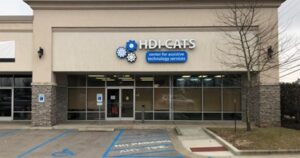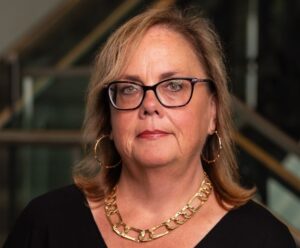Music therapy is gaining popularity as an effective approach for enhancing communication and social skills for people with developmental disabilities. This year’s cohort of Graduate Certificate in Developmental Disabilities students include four from UK’s Music Therapy Program.
Emma Foret comes from a family of musicians in rural West Tennessee.
She said, “My dad plays trumpet and is a big reason why I chose the same instrument. My mom majored in saxophone performance… And then my grandparents are bluegrass musicians who also play rock and country and were inducted into the music hall of fame in Selmer, Tennessee, and I played a lot with them… I have a violin background with bluegrass roots, and I played trumpet in middle school through college.”
Emma’s parents are also both teachers. Her mom is a Kindergarten through eighth grade music teacher, and her dad teaches high school band, both in the McNairy County school system in Selmer.
Of high school band, Emma says, “That was where I found my place.”
It was also where she saw the value of inclusivity in classrooms. She said, “I was a section leader… but because our program included a wide variety of students, I worked with a lot of diverse learners. I got a lot of experience there. Even though I knew very little, it was just a common practice that everyone participated, and I feel like that was an important experience that led me here.”
She added, “In the special areas, like art, music, PE, choir, all of those things – I think that’s where you can see inclusion at its best. Those activities are very community based already.”
After a degree in music education at the University of Tennessee at Martin (about an hour from Murray, KY), Emma wanted to learn more about inclusive music education.
“I loved working with kids, and then I realized there was such a gap in my knowledge on what I knew about how to work with diverse learners,” she said. “I had a few experiences in my student teaching where I knew I wanted to learn how to better serve every child in my classroom.’ So that’s what brought me here. And that’s what brought me to this certificate, especially.”
In the certificate program, students conduct a research project and participate in a practicum. Coursework covers the entire lifespan and prepares professionals to provide services and supports for people with developmental disabilities and their families.
For her research project, Emma will be looking at the gap in music classroom participation from kindergarten through high school. She said there is a major decrease as students get older. She also realized that there is a gap in knowledge for certain educators when it comes to students with disabilities.
She shared, “I thought it was so interesting because in an elementary school, you see everyone. Music is where everyone belongs and has their place. Unfortunately, the numbers decrease a little bit, the older they get.
Students in the certificate program also learn from a variety of guest speakers with disabilities.
“I get to hear a lot of very different, intelligent people,” Emma said. “And it’s always different when you hear about someone else’s experiences, because I haven’t experienced a disability… I think hearing from diverse guest speakers is one of the best things [about the program].”
The certificate program brings students from a range of disciplines, and each cohort is unique with its own array of different perspectives.
Emma noted that the program “is a really great opportunity for you to grow your mind past what you’ve experienced, and you work with such different people, regardless of if you’re in the therapy or education field… We have so many different discipline areas coming together to step in and advocate, and I think that’s awesome… Emma hopes to do her practicum at the Child Development Center of the Bluegrass on campus, where she and her husband (who also has a music education background) both work.
She said, “I was certified K-12 and I’ve always loved kindergarten through the awkward middle school phase… I’ve never taught students younger than kindergarten, but I love it. They’re so fun and are so eager to learn.”
Students often note that what they learn in the certificate program transforms their understanding of disability and advocacy.
Emma shared her experience this way:
…I’ve definitely developed [as an advocate] since being here. I see the world as sunshine and rainbows most of the time… I want to help everyone and make the world a better place, and I guess I didn’t realize how much we still have left to go… I’ve definitely taken on more of that approach since learning and hearing from people with disabilities over the past year with different guest lecturers… I can even think back on projects I did… where I was interested in music therapy and I was specifically interested in intellectual/developmental disabilities and my terminology wasn’t correct—I came at it with such a good heart, and I think most people do—it’s just not knowing or being aware of the community. I strive to advocate for [people with disabilities], but also want to promote their voice because everyone deserves to be heard and understood.
She went on to say, “The world needs to be more accessible for everyone. If I were to acquire a disability, I would want to be able to experience life the same way that I do now… I’ve just become so much more aware, and it’s made me a better human, it’s made me a better teacher, and hope to be a better therapist.”
For more information about HDI’s Graduate Certificate in Developmental Disabilities, follow this link: https://hdi.uky.edu/graduate-certificate.



